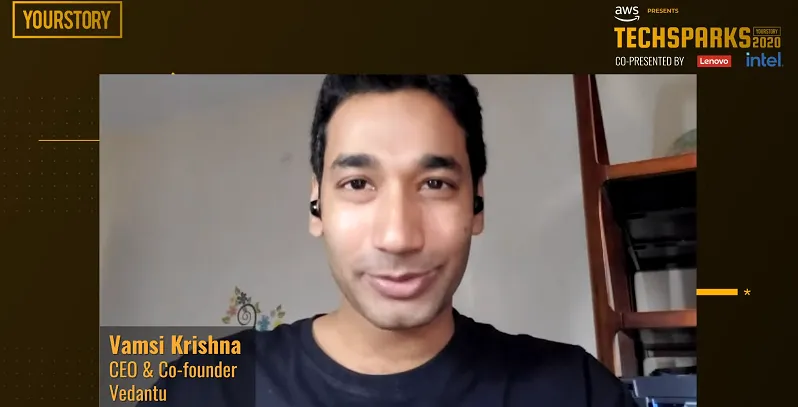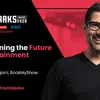[TechSparks 2020] How to build an engaging edtech platform: Vedantu’s Vamsi Krishna spills the secret sauce
At TechSparks 2020, Vedantu CEO and Co-founder Vamsi Krishna spoke about the learning experience and the resultant outcome, the two pillars that help measure the success of an edtech platform.
More than 150,000 students study in real time on live online learning platform each month. The edtech startup recorded a growth of 220 percent during the recent lockdown, with close to 1.5 million students attending live classes every month and teachers delivering more than eight million hours of classes.
However, this success did not happen overnight.
Addressing the audience virtually at the 11th edition of flagship event, TechSparks 2020, Vedantu Co-founder and CEO Vamsi Krishna explained further.
He said the two pillars to measure success were experience and outcome. The input behind creating something is as important as the output. He categorises the learning experience as the input and the learning outcome as the output.
Vamsi said, “Whenever you design a pedagogy, offline, online, synchronous, or asynchronous, the learning experience is extremely critical. If the input isn't proper, it will be very tough for you to expect a good output.”

Vedantu CEO and Co-founder Vamsi Krishna
The IIT graduate said while the learning outcome was easy to measure in cases like competitive exams with ranks, it was not so easy in many other cases. "It is fair to say that in almost 80 percent of the cases, if you invest enough and think deeply about it, you will be able to measure or define some metrics around learning outcomes.”
The measurement was either absolute or relative. When the platform can compare a student’s or user’s performance from the time they joined to after spending time on the platform, it is a relative measurement.
“That's the kind of learning outcome that is relatively easy to measure but the input, or the learning experience, is equally important - if not more - to optimise for, measure, and experiment,” he said.
Finding a balance
Vamsi considers building the framework an "intuitive process that comes with experience". Being able to connect with teachers is important for students to love the subjects. Similarly, the engagement leads to the outcome, most of the time.
“The way you design great pedagogy is to think about the learning experience and design it to ensure student engagement. If they really love it, the design can spark curiosity and inquisitiveness. If you are able to do that, the output happens. The way to think about it is to balance the two.”

Vamsi Krishna during the keynote session at the TechSparks 2020
Talking about Vedantu, he said his team went about designing the pedagogy differently for a Class 12 student as compared to a Class 1 student.
He advised startups to take choices, synchronous or asynchronous, seriously while developing a platform.
“There are multiple choices or formats, within which is the design. All these things are essentially decisions you need to take.”
In the asynchronous lessons, things like the length of the video, format, and design needs to be considered, he suggested.
In synchronous learning, one should think about the capability of the platform, how interactive it should be, what are those elements, the role of content, and the teacher delivering lessons.
Data is key
Vamsi said the second important aspect is data, stating that one needs to measure everything - how engaged the child is and where s/he is engaged and not. In an online platform, one can use this data to improvise on the content, improve teacher training, and even design better pedagogies.
“You can run these experiments and optimise, and soon you will have the most optimised learning journey for a particular cohort of students. Then, you must tie it to a learning outcome. Think about these two pillars and try to create a loop between them.”
The Vedantu CEO further elaborated on this by saying how the elements are correlated.
“If the experience is good, the child loves it and the learning outcome improves. If the learning outcome improves, it will motivate the child to spend more time and engage with the pedagogy more often.”
The more engaged s/he is with the pedagogy, the better is the learning outcome; this is the secret sauce, Vamsi said.
“It's about the learning experience leading to the outcome and that leading to an experience. Great learning products are able to do this repeatedly.”
Vamsi concluded by stating that he was proud to be at a juncture where startups like Vedantu were fundamentally reimagining and changing the way teaching and learning happens.
For more information on TechSparks 2020, check out our TechSparks 2020 website.
TechSparks - YourStory's annual flagship event - has been India's largest and most important technology, innovation, and entrepreneurship summit for over a decade, bringing together entrepreneurs, policymakers, technologists, investors, mentors, and business leaders for stories, conversations, collaborations, and connections that matter. As TechSparks 2020 goes all virtual and global in its 11th edition, we want to thank you for the tremendous support we've received from all of you throughout our journey and give a huge shoutout to our sponsors of TechSparks 2020.
Edited by Anju Narayanan


![[TechSparks 2020] How to build an engaging edtech platform: Vedantu’s Vamsi Krishna spills the secret sauce](https://images.yourstory.com/cs/2/79900dd0d91311e8a16045a90309d734/Screenshot22-1605093594004.png?mode=crop&crop=faces&ar=16%3A9&format=auto&w=1920&q=75)
![[TechSparks 2020] Byju Raveendran reveals the three pillars on which partnerships are made](https://images.yourstory.com/cs/2/bd251c602d6a11e9aa979329348d4c3e/FeatureImage-Option1-1578565309338.jpg?fm=png&auto=format&h=100&w=100&crop=entropy&fit=crop)





![[YS Exclusive] ‘Had to let a meaningful number of people go for the company’s growth’: Freshworks CEO Dennis Woodside](https://images.yourstory.com/cs/2/fe056c90507811eea8de27f99b086345/CopyofNewPPTTemplates62-1736395865849.jpg?mode=crop&crop=faces&ar=1%3A1&format=auto&w=1920&q=75)
